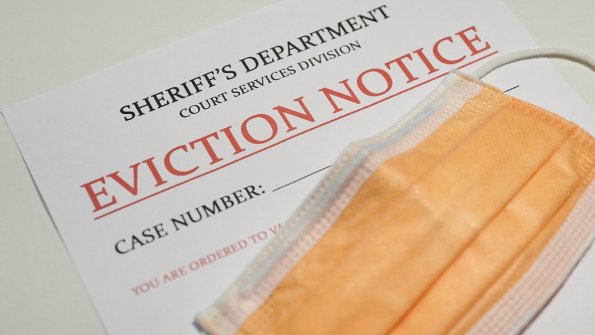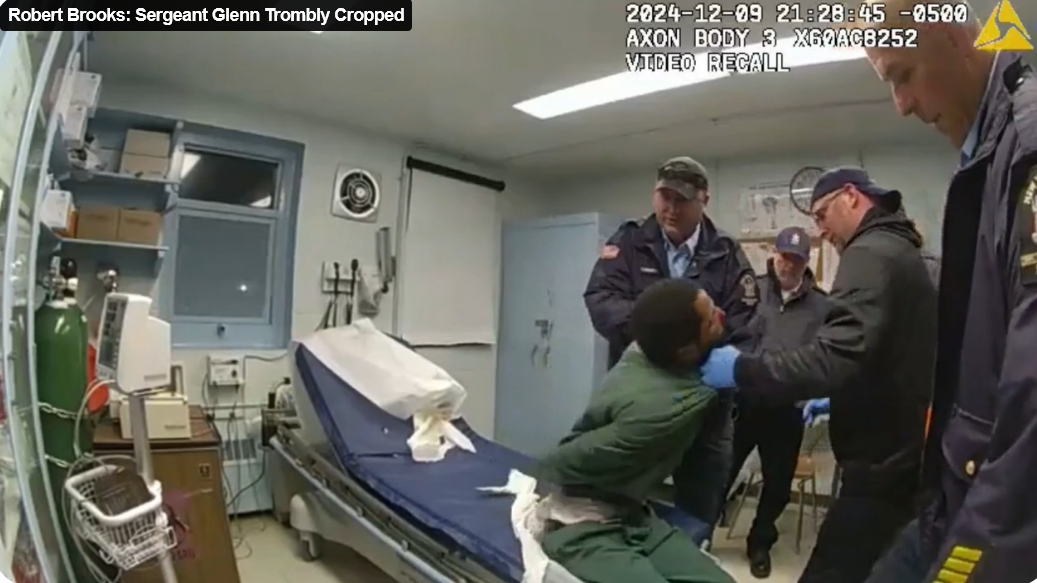Photos: YouTube\Twitter
WASHINGTON, D.C. — Today, Congresswoman Cori Bush (MO-01), Deputy Whip of the Congressional Progressive Caucus and Member of the House Committee on the Judiciary, Senator Elizabeth Warren (D-MA), Member of the Senate Committee on Banking, Housing, and Urban Affairs, and over three dozen of their colleagues introduced the Keeping Renters Safe Act of 2021 to enact an urgently needed nationwide eviction moratorium.
In direct response to the Supreme Court’s decision to strike down President Biden’s initial eviction moratorium on the grounds that the Secretary of the Department of Health and Human Services (HHS) lacked the statutory authority to mandate such a moratorium, the Keeping Renters Safe Act of 2021 would clarify that the HHS Secretary does permanently retain the authority to implement an eviction moratorium in the interests of public health.
“Housing is a human right, not a bargaining chip to let fall between bureaucratic cracks,” said Congresswoman Cori Bush. “Nearly 40 million Americans have tested positive for COVID-19. Over 670,000 people have died of this virus, and countless are living permanently disabled from its aftereffects. As the Delta variant continues to force individuals to quarantine, close schools, and stifle businesses, we must do all we can to save lives. That starts with keeping every person safely housed. The Keeping Renters Safe of 2021 will save lives and give us more time: time for renters to receive financial assistance, time for the economy to fully recover, and time for the pandemic to finally come to an end. I’m humbled to introduce this critical, actionable legislation with Senator Warren and so many of my colleagues.”
“This pandemic isn’t over, and we have to do everything we can to protect renters from the harm and trauma of needless eviction, which upends the lives of those struggling to get back on their feet,” said Senator Elizabeth Warren. “Pushing hundreds of thousands of people out of their homes will only exacerbate this public health crisis, and cause economic harm to families, their communities, and our overall recovery. Congress must pass the Keeping Renters Safe Act of 2021 to put the eviction moratorium back in place and clarify that HHS has the authority to protect renters throughout this public health crisis. Safe housing saves lives.”
The Keeping Renters Safe Act of 2021 will protect renters from eviction and curb the spread of COVID-19 by:
- Amending section 361 of the Public Health Service Act to grant permanent authority to the Department of Health and Human Services (HHS) to implement a residential eviction moratorium to address public health crises.
- Directing HHS to implement a national residential eviction moratorium in response to COVID-19 that: (1) Must be automatic, without requiring individuals to apply for coverage. (2) Applies to all residential eviction filings, hearings, judgments, and execution of judgments. (3) Allows the Secretary to establish appropriate moratorium exceptions necessary to protect the health and safety of others. (4) Remains in effect at least 60 days following the conclusion of the public health emergency.
Since the start of COVID-19, millions of renters have found themselves behind on rent for the first time in their lives, laid off from their jobs or found their hours cut during lockdowns. The federal, state and local eviction moratoria were mandated because lawmakers at every level recognized the dire urgency of preventing millions of people from being thrown out onto the street in the middle of a deadly global pandemic.
Since then, the majority of those eviction moratoria have lapsed, stimulus checks have come and gone, and unemployment benefits have expired. Yet, a significant portion of Americans continue to experience devastating levels of financial hardship. We know that the rental assistance program has failed to distribute close to 90 percent of the nearly $46 billion allocated to grantees and people are desperately waiting for help we promised. The Keeping Renters Safe Act of 2021 helps fulfill that promise.
“With millions of vulnerable renters at risk of being unhoused as COVID-19 deaths spike nationwide, Congress must act with urgency to prevent the impending eviction crisis and the trauma that would accompany it,” said Congresswoman Ayanna Pressley. “Our bill does that by reinstating the federal eviction moratorium so families can stay safely housed and access federal emergency rental assistance while we recover from this ongoing pandemic. Without collective action, COVID-19 will continue to spread, lives and homes will continue to be lost, and the hurt our communities are experiencing will only get worse. We’ve been fighting hard for this and we must act before it’s too late.”
“The coronavirus pandemic hasn’t ended and neither should emergency housing protections,” said Senator Ed Markey. “As a million Americans face eviction in the coming months, Congress has an urgent mandate to keep the eviction moratorium in place through the remainder of this public health emergency. The Keeping Renters Safe Act will ensure renters can count on a roof over their heads and not an eviction notice on their door. I thank Rep. Bush for her continued leadership on this lifeline issue and my colleagues for their partnership on this legislation.”
“Last month, I proudly stood alongside Rep. Bush and fought to keep as many as 11 million Americans from becoming homeless. Now, I’m proud to stand by her today as we continue that fight by introducing the Keeping Renters Safe Act,” said Congressman Mondaire Jones. “Despite how hard we fought, and the many days we stayed out on those Capitol steps, the far-right, 6-3 majority on the Supreme Court, in a dangerous, partisan decision, struck down the CDC’s eviction moratorium. This left millions once again at risk of eviction. In the world’s richest nation, no one should have to experience housing insecurity — especially not during a deadly pandemic with the Delta variant ravaging our communities. We have a moral obligation to ensure every person remains safe and housed for the duration of this pandemic and long after. That’s exactly what our bill, the Keeping Renters Safe Act, would do.”
“We continue to face a historic housing and homelessness crisis, which has only been exacerbated by the COVID-19 pandemic,” said Senator Alex Padilla. “In California alone, over 161,000 people experience homelessness each night – including families with young children, veterans, and victims of domestic violence. That is why I am proud to co-lead the Keeping Renters Safe Act of 2021, which will ensure people in California and across the country are protected from unreasonable and dangerous evictions.”
“At this very moment, families across the country are facing the prospect of eviction from their homes,” said Congresswoman Jan Schakowsky. “Not only does an eviction immediately threaten their safety and security but it can follow a family for years, making finding new housing challenging and limiting their opportunities. Housing is a human right. I’m proud to join my colleague Cori Bush to protect these families from eviction. Congress must act now to pass this legislation before even one more family loses their home.”
“I have lived through eviction,” said Vivian Smith, tenant leader, Miami Workers Center and the Homes Guarantee Campaign at People’s Action. “I have lived through homelessness. I have been forced to make choices between feeding my kids and paying the rent. No one should have to make this choice. During the pandemic, I’ve been forced to choose between my health and my home, returning to work before it was safe in order to avoid eviction. Tenants like me need Congress to act with urgency to pass an eviction moratorium, to end all evictions, now and at least until the public health emergency is over.”
“Congress should enact this broad eviction moratorium to keep millions of families safely and stably housed during the pandemic,” said Diane Yentel, president and CEO of the National Low Income Housing Coalition. “The Supreme Court’s ruling to lift the moratorium will have devastating and long-lasting consequences. The moratorium was a lifeline for millions of renters, and the last federal protection keeping many of them stably housed as they wait for emergency rental assistance to reach them. Without the moratorium in place, families will be pushed deeper into poverty, communities will struggle with increased spread of COVID-19, and our country will have a harder time containing the virus.”
“The Metropolitan St. Louis Equal Housing and Opportunity Council enthusiastically supports this proposed legislation,” said Will Jordan, Executive Director, Metropolitan St. Louis Equal Housing and Opportunity Council. “As long as the pandemic continues and aid dollars sit unspent, allowing evictions to proceed is both a moral and public health policy failure. We urge congress to work with the urgency that this crisis demands, and that this legislation be sent to the president’s desk as quickly as possible.”
“Legal Services of Eastern Missouri provides legal help to many clients in Missouri’s First Congressional District who are vulnerable to potential eviction, or who are currently facing eviction,” said Dan K. Glazier, Executive Director & General Counsel. Legal Services of Eastern Missouri, Inc. “The proposed legislation, the “Keeping Renters Safe Act of 2021,” would likely impact the communities we serve by helping them: 1) avoid homelessness; and 2) promote their health and the health of others in the community by lowering the chances of our clients getting or spreading Covid-19.”
“Right now, in the middle of a pandemic and the climate crisis, millions of people risk losing their homes, their security, and their safety because a partisan, undemocratic Supreme Court ended the eviction moratorium,” said Lauren Maunus, Sunrise Movement Advocacy Director. “In the wealthiest country in the world, no one should be forced from their home or be houseless. Elected officials must pass the Keeping Renters Safe Act of 2021 so families can remain in their homes as we deal with a deadly pandemic and unrelenting climate crisis ravaging our most vulnerable communities.”






